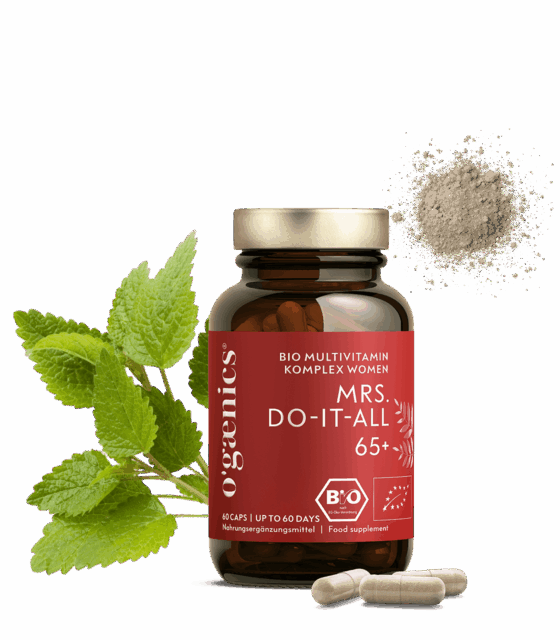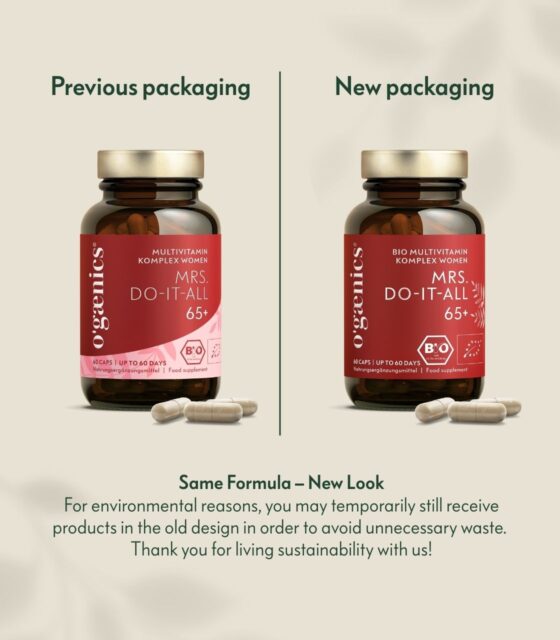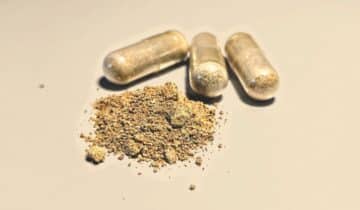Age brings with it many visible changes – gray hair, wrinkles and perhaps a few less muscles. But the invisible changes in our body are often the more profound ones. One of these is what is known as nutrient blindness: the body’s ability to recognize, absorb and use nutrients from food decreases over time. Studies show that energy requirements fall by around 100 kcal per decade of life from the age of 65, while the need for essential nutrients such as vitamin D, B12 and calcium remains the same or increases.
This phenomenon is at the center of healthy aging, as it not only affects our energy and vitality, but also poses numerous health risks. Nutrient blindness is increasingly understood as one of the Hallmarks of Aging, a key process that defines and can accelerate aging. But what exactly is happening in our bodies and how can we counteract this development?
What does nutrient blindness mean?
Nutrient blindness, often referred to as “dysregulated nutrient sensing”, describes the decreasing ability of our body to react to nutrients in food. Signaling pathways that control metabolism – such as the mTOR pathway (mammalian target of rapamycin) or the AMPK receptor (adenosine monophosphate-activated protein kinase) – become increasingly inefficient or dysregulated with age.
- mTOR pathway: Responsible for cell growth and energy utilization. However, excessive activation in old age can lead to chronic inflammation and cell damage.
- AMPK receptor: Activated in times of nutrient deficiency, it helps to conserve energy. This mechanism is often weakened in older people.
What causes nutrient blindness?
- Changes in the digestive system: With increasing age, the production of stomach acid decreases. This decrease significantly impairs the absorption of vitamin B12, folic acid and calcium. Studies show that a vitamin B12 deficiency is widespread in older people and can lead to neurological disorders and anemia.
- Chronic diseases: Diabetes, high blood pressure or arthritis affect metabolic pathways and the availability of nutrients.
- Reduced food intake: Many older people eat less, which further reduces their intake of essential nutrients.
- Cellular changes: Ageing reduces the efficiency of cells to process nutrients and obtain energy from them.
Nutrient blindness is therefore not just a side effect of ageing, but a profound change that requires active countermeasures.
The Hallmarks of Aging and Nutrient Blindness
Nutrient blindness is considered one of the Hallmarks of Aging, a process that drives aging. But what makes these hallmarks so significant?
1. ageing cells and “dysregulated nutrient sensing”
Studies show that the ability of our cells to recognize and respond to nutrients decreases significantly with age. This leads to dysregulation of metabolic pathways and increases the risk of diseases such as cancer, cardiovascular disease and diabetes.
2. influence on cell repair and immune function
A disturbed nutrient balance significantly reduces the efficiency of the immune system. Studies show that a lack of vitamin D and zinc increases the risk of infection and prolongs recovery time. It directly affects the body’s ability to repair damaged cells and strengthen the immune system. This makes older people more susceptible to infections and inflammation.
Which nutrients are particularly affected?
-
Mrs Do-It-All 65+
Organic Multivitamin Complex Premium from vitamin A to zinc for women aged 65 and over, All-In-One!79,90 €2.091,62 € / kg
1. vitamin B12 and folate
Important for energy production and nerve function. Stomach acid production decreases with age, making it more difficult to absorb B12. Folate plays an important role in cell metabolism and is often inadequately absorbed. According to studies, many older adults have a folate deficiency, which impairs cell division and blood formation.
2. vitamin D3 and K
Essential for bone health and the immune system. The body’s own production of vitamin D decreases with age, while the diet often provides too little vitamin K, which improves calcium utilization. Over 50% of the older population have a vitamin D deficiency, as the body’s own synthesis capacity decreases due to reduced sun exposure and age-related skin changes
3. zinc and selenium
Two powerful antioxidants that prevent cell damage and strengthen the immune system. They are often not sufficiently absorbed through food. A zinc deficiency can reduce immune function by up to 30 %. Selenium is also crucial for the body’s defenses and cell protection, but is often inadequately absorbed.
4. omega-3 fatty acids
Important for the cardiovascular system and brain function. Many older people consume too little omega-3, which can increase the tendency to inflammation in the body.
5. magnesium
Helps to regulate energy metabolism and prevent muscle cramps. With increasing age, magnesium intake from the diet decreases. A lack of magnesium is common and is associated with muscle cramps, fatigue and an increased risk of high blood pressure.
These nutrients are crucial for health in old age and form the basis for an active and fulfilling life.
Effects of nutrient deficiencies
Short-term symptoms
- Lack of energy: A lack of B vitamins or iron can quickly lead to tiredness and concentration problems.
- Susceptibility to infections: without sufficient vitamin C, D and zinc, the immune system is weakened. A study shows that vitamin D deficiency increases the likelihood of severe respiratory infections. Similar results were found for zinc, which modulates the immune system.
Long-term risks
- Osteoporosis: A lack of calcium, vitamin D and K increases the risk of bone loss and fractures.
- Cognitive impairment: Too little B12 and folate can impair brain function. A lack of vitamin B12 and folate is increasingly associated with dementia and Alzheimer’s disease, as a recent study shows.
- Chronic inflammation: A lack of antioxidants promotes inflammatory processes in the body.
Nutrient deficiencies are therefore not just a short-term problem, but can have a significant long-term impact on quality of life.
Solutions – What can we do?
Adapt your diet
- More plant-based foods: vegetables, fruit, wholegrain products and nuts provide important vitamins and minerals.
- Eat a protein-rich diet: As muscle loss increases with age, protein-rich foods such as pulses and fish should be a regular part of your diet.
Targeted nutritional supplementation
In cases where diet alone is not enough, high-quality nutritional supplements such as Mrs Do-It-All 65+ can play a crucial role. This product contains all the essential nutrients specifically tailored to the needs of older people, including vitamin D3, a vitamin B complex, zinc and selenium as well as bioactive plant extracts. Notably, it is free from gluten and pesticides, making it a safe and effective option.
-
Mrs Do-It-All 65+
Organic Multivitamin Complex Premium from vitamin A to zinc for women aged 65 and over, All-In-One!79,90 €2.091,62 € / kg
- Contains all critical nutrients such as vitamin D3, B-complex and antioxidants.
- The combination of 17 essential vitamins, minerals and 25 bioactive plant extracts is specially tailored to the needs of older people
- Mrs Do-It-All 65+ is gluten-free and pesticide-free, which is particularly beneficial in old age.
- Scientifically proven dosages to effectively compensate for deficiencies.
Conclusion – Active against nutrient blindness
Nutrient blindness is a natural side effect of ageing, but it is not inevitable. The evidence shows that a conscious diet combined with targeted supplementation can offset the effects of nutrient blindness. Regular checks of nutrient status by a doctor or nutritionist are important to identify specific deficiencies and take timely action. With Mrs Do-It-All 65+ you can help your body to cope with age-related challenges. The key lies in the combination of prevention, science-based support and a mindful lifestyle.
German Nutrition Society, Austrian Nutrition Society, Swiss Nutrition Society (ed.) (2024), Referenzwerte für die Nährstoffzufuhr, 2nd edition, 8th updated edition, Köllen Druck + Verlag GmbH: Bonn
How well supplied are Germans with nutrients? 13th DGE Nutrition Report examines the supply of vitamin D, folate, sodium, potassium and iodine. DGE aktuell 06/2017 from 15.08.2017
DGE (2016): 13th DGE Nutrition Report
Schwab M. et al. (2014): The use of dietary supplements among older persons in Southern Germany – Results from the KORA-age study. The journal of nutrition, health & aging (18): 510-519
Max Rubner Institute (2008): National Consumption Study II
Rutjes AWS et al (2018): Vitamin and mineral supplementation for the prevention of cognitive decline in middle and late life in cognitively healthy people. Cochrane Review, 17.12.2018
WHO guideline on dementia prevention (2019): Risk Reduction of Cognitive Decline and Dementia,







 No products in the cart.
No products in the cart.